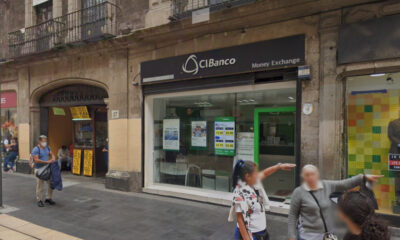Business
Trump signs executive order creating U.S. Strategic Bitcoin Reserve

President Donald Trump has signed an executive order to establish a Strategic Bitcoin Reserve and a Digital Asset Stockpile using asset forfeitures.
The order was signed on Thursday evening. The reserve will be capitalized with Bitcoin owned by the federal government that was forfeited as part of criminal or civil asset forfeiture proceedings, according to White House A.I. & Crypto Czar David Sacks.
Sacks stated that the U.S. government is estimated to own about 200,000 Bitcoin, though there has never been a full audit of its digital asset holdings. The executive order directs a comprehensive accounting of the federal government’s digital asset holdings.
Unlike previous instances where the U.S. has auctioned seized Bitcoin, the executive order specifies that Bitcoin deposited into the reserve will not be sold. It will be kept as a store of value, with Sacks comparing it to a digital Fort Knox for the cryptocurrency often referred to as digital gold.
Premature sales of Bitcoin have cost U.S. taxpayers over $17 billion in lost value, but the federal government will now have a strategy to maximize the value of its holdings, Sacks claimed.
The executive order further authorizes the Secretaries of Treasury and Commerce to develop budget-neutral strategies for acquiring additional Bitcoin, provided that these strategies impose no incremental costs on American taxpayers.
In addition to the Bitcoin Reserve, the executive order establishes a U.S. Digital Asset Stockpile, which will consist of digital assets other than Bitcoin that have been forfeited through criminal or civil proceedings.
Sacks emphasized that the order aligns with Trump’s broader vision for cryptocurrency policy. During his election campaign, Trump promised to make the U.S. the “crypto capital of the world.”
Bitcoin, the first and most valuable cryptocurrency, was created in 2009 as a decentralized digital asset that operates independently of central banks. It has become a key asset for investors and institutions seeking an alternative store of value.
Governments around the world have taken different approaches to Bitcoin, with some embracing it as a legitimate financial instrument and others seeking to regulate or restrict its use. The U.S. government has historically seized Bitcoin from criminal enterprises and auctioned it off through agencies such as the U.S. Marshals Service.

-

 Legal4 days ago
Legal4 days agoFirefighters ambushed while responding to Idaho wildfire, at least 2 killed
-

 US News1 week ago
US News1 week agoSmall meteorite fragment may have struck Georgia home
-

 Legal1 week ago
Legal1 week agoArmed woman blocks traffic on freeway in Houston, Texas
-

 Legal6 days ago
Legal6 days agoWashington Post journalist Thomas LeGro arrested for child porn possession
-

 World4 days ago
World4 days agoTropical Storm Barry forms in the Gulf, expected to make landfall in eastern Mexico
-

 Health1 week ago
Health1 week agoCambodia confirms 7th human H5N1 bird flu case in 2025
-

 Business1 week ago
Business1 week agoU.S. sanctions 3 Mexican financial firms over fentanyl-linked money laundering
-

 World1 week ago
World1 week agoLandslide kills at least 10, leaves 15 missing in Colombia



